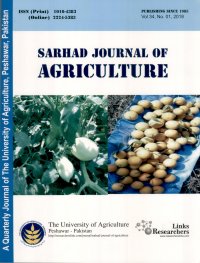Adverse Effect of Sublethal Concentrations of Insecticides on the Biological Parameters and Functional Response of Predatory Beetle Coccinella septempunctata (Coleoptera: Coccinellidae) of Brassica Aphid
Rahat Afza, Muhammad Asam Riaz*, Muhammad Afzal and Muhammad Zeeshan Majeed
ABSTRACT
Over use of synthetic insecticides can disturb ecosystem and non-target organisms particularly the effectiveness of natural insect pest predators. Herein, the effect of insecticides at their sublethal concentrations was assessed on the biological parameters and functional response of Coccinella septempunctata. All insecticides significantly reduced the fecundity, TPOP (total pre-oviposition period), larval weight and increased the life span of C. septempunctata relative to control. Thiamethoxam and lambda-cyhalothrin non-significantly reduced the coccinellids larval weight. Type II response was shown by larvae of C. septempunctata in control treatment. Larval coccinellids showed type II functional response after feeding on the brassica aphids (Brevicoryne brassicae) treated with thiamethoxam, lambda-cyhalothrin and cypermethrin, while imidacloprid, profenophos and chlorpyrifos treated aphids altered the functional response of larval coccinellids from type II to III. The change in response was linked to unconsciousness and disorientation induced by the insecticides targeting insect nervous system. Conclusively, none of the insecticides was found safe and all insecticides have had adverse effects on the life parameters of coccinellid beetle C. septempunctata. However, thiamethoxam, lambda-cyhalothrin and cypermethrin did not change the functional response of larval coccinellids; while, these insecticides increased the handling time and decreased the maximum attack rate relative to control. Thiamethoxam, lambda-cyhalothrin and cypermethrin were considered relatively safe for the larval coccinellids and hence are recommended for aphid control.
To share on other social networks, click on any share button. What are these?







